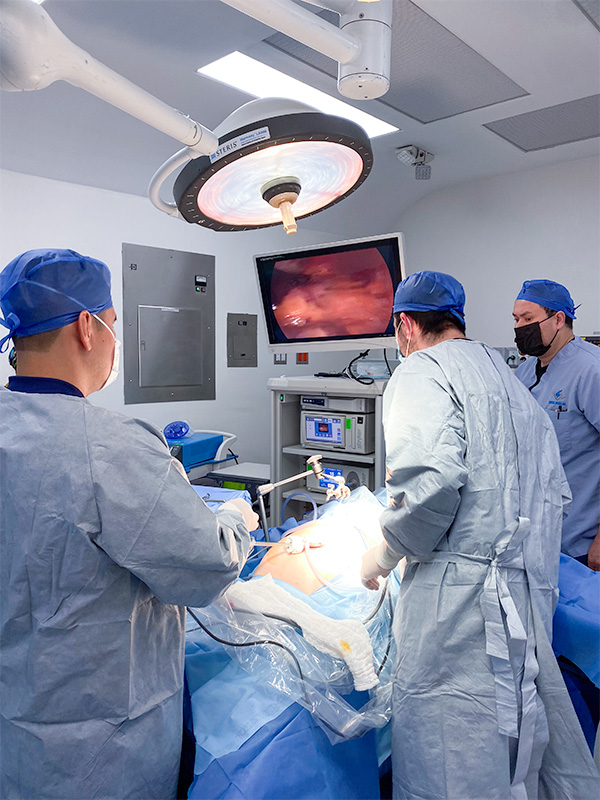AnemiaA condition in which the body does not have enough healthy red blood cells.
AnxietyMental health disorder characterized by feelings of worry, anxiety or fear.
Laparoscopic adjustable gastric banding (LAGB): A type of bariatric surgery that involves placing a band around the upper part of the stomach to create a small pouch and a narrow passage to the rest of the stomach.
Roux-en-Y gastric bypass (RYGB): Type of bariatric surgery that reduces the size of the stomach and changes the way food passes through the intestine.
Ketoacidosis: A serious condition that can occur in people with diabetes, when the body produces high levels of acids in the blood called ketones.
Bariatric surgery: A type of surgery performed to help people lose weight, usually by changing the shape of the digestive system.
Bariatric revision surgery: Surgery performed to modify or correct problems associated with previous bariatric surgery.
Cholesterol: A fat-like substance found in all cells of the body that can cause health problems if levels are too high.
Iron deficiency: A condition that occurs when the body does not have enough iron, a mineral essential for the production of red blood cells.
Vitamin B12 deficiency: A condition that occurs when the body does not have enough vitamin B12, a vitamin essential for the production of red blood cells and the functioning of the nervous system.
Vitamin deficiency: A condition that occurs when the body does not receive or cannot absorb certain vitamins necessary for normal functioning.
Depression: Mental illness that causes feelings of sadness and loss of interest in activities previously enjoyed.
Malnutrition: A state of health that occurs when a person does not consume enough nutrients to function properly.
Pulmonary embolism (PE): Blockage in one of the pulmonary arteries in the lungs.
Endoscopy: A procedure that uses a flexible tube with a light and a camera to visualize the inside of the digestive tract.
Physical exercise: Activity requiring physical exertion, performed to maintain or improve health and fitness.
Gastritis: Inflammation of the stomach lining.
Gastrointestinal bleeding: Bleeding occurring in the gastrointestinal tract.
Hernia: A condition that occurs when a part of an organ pushes through an opening in the muscle or tissue that supports it.
Hypoglycemia: A condition characterized by low blood sugar levels.
Hydration: The process of consuming enough water to keep the body functioning properly.
Surgical wound infection: Infection occurring in the area where the surgery was performed.
Body mass index (BMI): A measure used to determine whether a person has a healthy weight in relation to his or her height.
Laparoscopy: Surgical procedure that uses small incisions and a specialized camera to view and operate inside the body.
Malabsorption: A condition that occurs when the body cannot adequately absorb nutrients from food.
Gastric Sleeve (GS): A type of bariatric surgery that reduces the size of the stomach in the form of a tube, which limits the amount of food that can be consumed.
Obesity: A condition characterized by excess body fat, which can increase the risk of health problems.
Morbid obesity: Term used to describe severe obesity, usually with a BMI of 40 or more.
Osteoporosis: A condition that weakens bones and makes them more prone to fracture.
Weight loss: Process of losing body fat and/or muscle mass.
Skin folds: Measurement of the thickness of the fatty tissue under the skin.
Prebiotics: Foods or food ingredients that promote the growth of beneficial bacteria in the gut.
Probiotics: Live microorganisms taken to improve intestinal health.
Malabsorption procedure: A type of bariatric surgery that alters the way food passes through the intestine to reduce the amount of nutrients and calories the body can absorb.
Gastroesophageal reflux (GER): A condition in which stomach contents back up into the esophagus, causing heartburn and other symptoms.
Bariatric revision: Surgery performed to modify or correct problems with previous bariatric surgery.
Exercise routine: Regular series of physical exercises designed to improve health and fitness.
Metabolic syndrome: It is a group of disorders that occur together, significantly increasing the risk of heart disease, stroke and type 2 diabetes. The disorders that make up the metabolic syndrome include hypertension (high blood pressure), hyperglycemia (excess blood sugar that may indicate type 2 diabetes), hyperlipidemia (high triglyceride levels and low high-density lipoprotein levels in the blood), and obesity, especially with excess fat around the waist.
Overweight: A condition that occurs when a person has a weight greater than that considered healthy for his or her height.
Eating disorder: Mental condition that affects eating habits and can have a significant impact on physical health.
Deep vein thrombosis (DVT): A blood clot that forms in a deep vein, often in the leg.
Gastric ulcers: Sores that form in the stomach lining.
Peptic ulcer: Open sores that develop on the inner lining of the stomach and upper small intestine.
Vomiting: Forced expulsion of stomach contents through the mouth.







